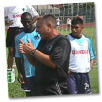Reductionism
There a tendency to take a reductionist approach to training, there is a focus on a muscle that is weak or not firing, a single exercise that will do it all. It seems to me a more balanced and in some ways sane approach is to look at the whole and see how everything is working together or cooperating. The same is true with exercise or training method selection look for exercises and methods that are synergistic, that help the body make connections. Breaking movements into small parts or focusing on individual muscles will lead to disjointed uncoordinated movement. I think this occurs because it is easier to analyze movements part by part rather than as a whole. As far as isolating muscles that is the way we are taught anatomy. All of this leads us away from the direction we need to go. In movement the whole is significantly greater than the sum of the parts. One must constantly consider the interaction of the three movement constants, the body, gravity and the ground.


4 Comments:
HOWEVER, when coaching competitive swimmers we often break the whole stroke into components while searching for crucial connections.
E.g., if the torso is the engine and the extremities (arms and hands) play a lesser role, we often swim strokes with one arm seeking for that torso-extremity connection/link.
There are a lot of young competitive swimmers in the U.S. In Naperville, Il., e.g., there are over 3,000 in summer leagues alone.
What are the best approaches (in and out of the water) to help young swimmers learn about how to use the torso in swimming long axis (free and back) and short axis (fly and breaststroke)? One is breaking strokes into components.
With regard to high school athletic training, reductionism is a great way to bore someone to death! A good rule of thumb for all high school A.T.'s- if a kid can listen to his I Pod or text message or Nintendo DS during your protocol, you are probably wasting their & your time.
exercise can get so boring. less clutter exercise and more quality play? or just look busy?
T/ F athletes who are mad, are good athletes.
Vern,
I'm a "functional fitness guy" and believe it's important to respect the wisdom of mother nature or in other words we shouldn't try to force "manmade" concepts on the body. Your work on the topic of functional training is truly pioneering and much appreciated. I constantly remind myself that we're all standing on the shoulders of others and it's important to give praise when it's due. After all, there's not much new under the sun, but just different ways to describe it....
Post a Comment
<< Home